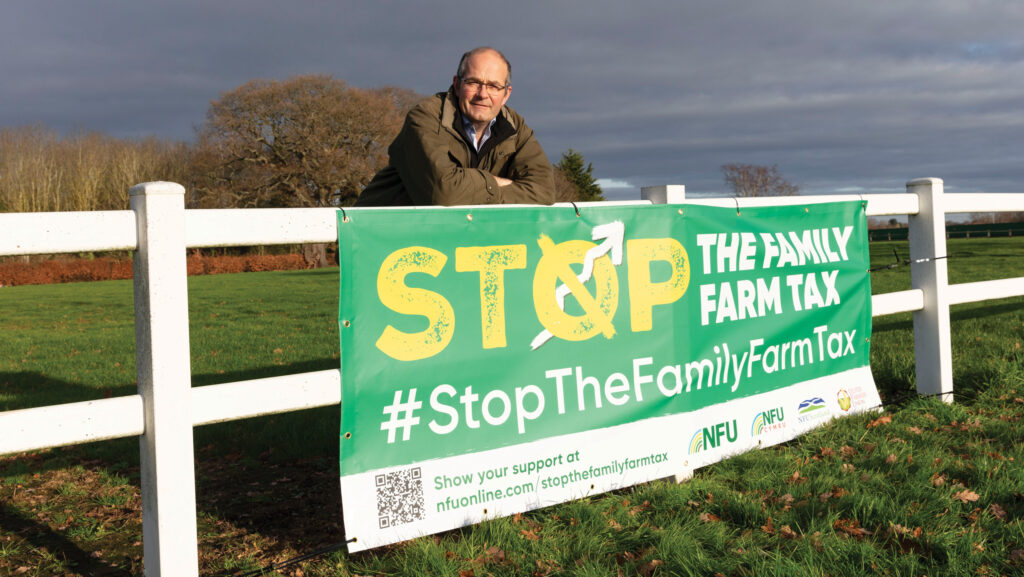Labour government challenged to deliver for farming in 2025
 NFU president Tom Bradshaw © NFU
NFU president Tom Bradshaw © NFU As 2025 begins, farm leaders are urging the Labour government to deliver on its pre-election promises for agriculture.
Central to their calls are resolving contentious tax reforms, bolstering support for sustainable farming, and ensuring the future of British food production.
The UK government’s decision to remove key inheritance tax reliefs for agricultural and business property has ignited widespread anger among farming communities.
See also: Farmers Weekly Podcast Ep 231: London ‘farm tax’ protest special
NFU president Tom Bradshaw described the policy as a “betrayal”, warning it could devastate family farms and rural communities.
“In all my years in the industry, I’ve never experienced such anger, despair, and betrayal,” he said, calling for prime minister Sir Keir Starmer and chancellor Rachel Reeves to address the issue urgently.
“Pre-election, Labour’s promises gave us optimism. Now, we need action,” added Mr Bradshaw.
NFU Scotland president Martin Kennedy voiced concerns about the “unintended consequences” of the proposals, emphasising their misdirected focus.
“These proposals completely miss the intended target of large-scale investors using land as a tax haven and instead, are causing untold stress on family farms and crofts,” he said.
NFU Cymru president Aled Jones called for the government to pause the tax reforms and carry out a comprehensive impact assessment, warning of the long-term effects on farming families and food production.
Perfect storm
The UK farming industry is reeling from a combination of volatile input costs, record commodity price fluctuations, reduced direct payments and a disastrous harvest due to extreme weather.
Describing 2024 as “a wretched year” for the industry, Mr Bradshaw said this combination of factors has “left many farming businesses struggling to survive”.
English farmers are demanding immediate improvements to environmental schemes, particularly the Sustainable Farming Incentive and other Environmental Land Management schemes.
National Sheep Association chief executive Phil Stocker said declining support payments and the looming tax burden are leaving farmers “at a loss”.
He urged the government to create a long-term vision for agriculture that considers global protein demand and food security alongside the wide array of environmental and social outcomes that farming provides.
Ulster Farmers’ Union president William Irvine said ring-fenced, inflation-proofed agricultural support is vital to protect local food security.
This comes as rising costs, uncertainty over planning, and bovine TB have stretched farmers in Northern Ireland to their limits.
Farming leaders are also seeking assurances on robust food import standards to prevent lower-quality imports from undercutting UK producers.
Staying optimistic
Despite the challenges, leaders remain optimistic about the future of British farming.
“We are the only industry the country cannot do without, and this is beginning to be recognised by all governments,” said Martin Kennedy.
Leaders emphasised the need to protect agriculture’s vital role in producing nutritious food and maintaining environmental sustainability.
Farming unions outline seven key demands for 2025
The four main UK farming unions have outlined critical demands for the Labour government in 2025 to safeguard the future of British agriculture.
1. Inheritance tax reforms Unions, led by the NFU, are calling for a reversal of plans to limit 100% inheritance tax relief for business and for agricultural assets worth £1m or below from April 2026.
2. Long-term funding The unions stress the need for multi-annual funding agreements to provide stability, enabling farmers to invest in sustainable practices without sudden policy shifts.
3. Supply chain fairness Legislation is needed to ensure fair pricing, protect producers from unfair retail practices, and provide transparent profit-sharing mechanisms.
4. Robust import standards Unions want import standards to prevent cheaper, lower-quality product from undercutting British farmers, covering environmental, welfare, and safety standards.
5. Public procurement A push for public institutions, such as schools and hospitals, to prioritise locally sourced British food in their procurement policies.
6. On-farm infrastructure Unions seek planning reforms to support renewable energy, water storage, and processing facility developments.
7. Mental health support Improved access to mental health services tailored to rural communities is a top priority to address rising challenges.
